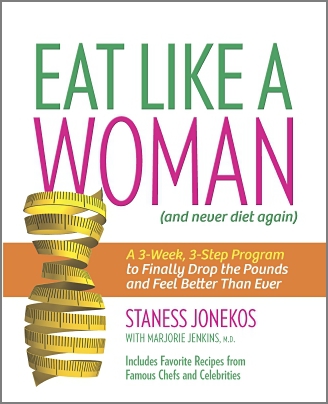The present of being present: cortisol and mindfulness meditation
Sometimes things are just timely. Like this post, which I am bringing back today for your consideration.
Happy Friday, folks! Wishing you a stress free weekend!
It seems that I write about stress a lot on FlashFree. Perhaps that is because like many, my life — namely my work — can be very stressful from time to time. However, according to the American Psychological Association, I’m not alone; most Americans suffer from moderate to high stress and the problem does not appear to be going away. Moreover? Work issues are the primary stressors in 77% of people.
From a midlife perspective, stress and its related hormone, cortisol, can cause a lot of health-related problems. In fact, not only does cortisol promote a fat dump in the midsection, but experts say that overexposure to cortisol and other stress hormones has a cumulative affect, leading to heart disease, sleep issues, digestive issues, obesity, depression and worsening of skin conditions. It’s critical to counter stress’ negative effects before they take their toll and start to do permanent damage. One important strategy to achieve a better balance is meditation.
Fortunately, a team of researchers at UC Davis’ Center for Mind and Brain are devoting time to studying psychological and physiological processes in order to explain the benefits of meditation. The framework for this effort is the Shamatha Project, which is apparently the most comprehensive meditation study ever undertaken. Most importantly, this scientific twist on a centuries old practice may ultimately elevate meditation’s place in Western medicine.
To better understand the effects of meditation on stress, the research team recently took 60 people (between the ages of 22 and 69) who had some prior experience with meditation, measured cortisol and body mass index and their current degree of ‘mindfulness,*’ and then randomly assigned them to a three month meditation retreat or a waiting list. Those on the waiting list participated in the same, three-month retreat at a later date. (*Participants completed a mindfulness questionnaire that measured the degree that these people directed their cognitive resources to sensory experiences and how often they drifted, as well as their ability to let go of distressing thoughts.)
At the retreat, the group met two times a day for one hour, guided sessions and the rest of the time (around 6 hours) practiced solo meditation in 20 to 30 minute increments. Meditation practices were focused on mindful breathing and relaxation and promoted compassion and kindness toward others. Overall, the emphasis was on present awareness rather than meandering into the future of ‘what if’s.’ During the middle of the retreat, all were encouraged to enter into silence for a period of about four weeks. Aside from scheduled meals and group meditations, everyone was on their own to decide sole meditation, exercise and free time.
Did learning how to direct and focus attention away from uncontrolled, ruminating thoughts and worry and toward a chosen target reduce cortisol levels? The researchers say that they found a correlation between a high score for mindfulness and a low score in cortisol, both before and after the retreat. The results were greatest for participants who were able to achieve the greatest increases in mindfulness, that is, the more that they reported directing their thoughts to the present/immediate experience, the lower their resting cortisol levels were. Participants also experienced large improvements in overall wellbeing, daily mood and emotional functioning.
While the findings do not prove cause and effect, they do suggest that changing the mind paradigm to focus on the now rather than the future may ultimately help to reduce our tendency to think about the past or worry about the future and in turn, counter excessive cortisol release.
Tonya Jacobs, a postdoctoral researcher and the study’s lead author, explains that “the idea that we can train our minds in a way that fosters healthy mental habits and that these habits may be reflected in mind-body relations is not news; it’s been around for centuries. But, accumulating evidence might help the idea — that the present is the best present we can give ourselves — be better integrated into Western mentalities and health practices.
Mindful meditation may ultimately prove to be one of our strongest defenses against stress and its companion, cortisol!
Read MoreThe present of being present: cortisol and mindfulness meditation
 It seems that I write about stress a lot on Flashfree. Perhaps that is because like many, my life — namely my work — can be very stressful from time to time. However, according to the American Psychological Association, I’m not alone; most Americans suffer from moderate to high stress and the problem does not appear to be going away. Moreover? Work issues are the primary stressors in 77% of people.
It seems that I write about stress a lot on Flashfree. Perhaps that is because like many, my life — namely my work — can be very stressful from time to time. However, according to the American Psychological Association, I’m not alone; most Americans suffer from moderate to high stress and the problem does not appear to be going away. Moreover? Work issues are the primary stressors in 77% of people.
From a midlife perspective, stress and its related hormone, cortisol, can cause a lot of health-related problems. In fact, not only does cortisol promote a fat dump in the midsection, but experts say that overexposure to cortisol and other stress hormones has a cumulative affect, leading to heart disease, sleep issues, digestive issues, obesity, depression and worsening of skin conditions. It’s critical to counter stress’ negative effects before they take their toll and start to do permanent damage. One important strategy to achieve a better balance is meditation.
Fortunately, a team of researchers at UC Davis’ Center for Mind and Brain are devoting time to studying psychological and physiological processes in order to explain the benefits of meditation. The framework for this effort is the Shamatha Project, which is apparently the most comprehensive meditation study ever undertaken. Most importantly, this scientific twist on a centuries old practice may ultimately elevate meditation’s place in Western medicine.
To better understand the effects of meditation on stress, the research team recently took 60 people (between the ages of 22 and 69) who had some prior experience with meditation, measured cortisol and body mass index and their current degree of ‘mindfulness,*’ and then randomly assigned them to a three month meditation retreat or a waiting list. Those on the waiting list participated in the same, three-month retreat at a later date. (*Participants completed a mindfulness questionnaire that measured the degree that these people directed their cognitive resources to sensory experiences and how often they drifted, as well as their ability to let go of distressing thoughts.)
At the retreat, the group met two times a day for one hour, guided sessions and the rest of the time (around 6 hours) practiced solo meditation in 20 to 30 minute increments. Meditation practices were focused on mindful breathing and relaxation and promoted compassion and kindness toward others. Overall, the emphasis was on present awareness rather than meandering into the future of ‘what if’s.’ During the middle of the retreat, all were encouraged to enter into silence for a period of about four weeks. Aside from scheduled meals and group meditations, everyone was on their own to decide sole meditation, exercise and free time.
Did learning how to direct and focus attention away from uncontrolled, ruminating thoughts and worry and toward a chosen target reduce cortisol levels? The researchers say that they found a correlation between a high score for mindfulness and a low score in cortisol, both before and after the retreat. The results were greatest for participants who were able to achieve the greatest increases in mindfulness, that is, the more that they reported directing their thoughts to the present/immediate experience, the lower their resting cortisol levels were. Participants also experienced large improvements in overall wellbeing, daily mood and emotional functioning.
While the findings do not prove cause and effect, they do suggest that changing the mind paradigm to focus on the now rather than the future may ultimately help to reduce our tendency to think about the past or worry about the future and in turn, counter excessive cortisol release.
Tonya Jacobs, a postdoctoral researcher and the study’s lead author, explains that “the idea that we can train our minds in a way that fosters healthy mental habits and that these habits may be reflected in mind-body relations is not news; it’s been around for centuries. But, accumulating evidence might help the idea — that the present is the best present we can give ourselves — be better integrated into Western mentalities and health practices.
Mindful meditation may ultimately prove to be one of our strongest defenses against stress and its companion, cortisol!
Read MoreGet a jump start on those resolutions: eat like a woman
It’s the day after the American Thanksgiving when many of us have indulged beyond the pale, entered food coma land and may even be contemplating another piece of pie for breakfast. Hey, I am all for it! I typically bring the most decadent dish that I can think of; this year it was grits dressing which I refer to as ‘cholesterol’s nightmare!’ Seriously, is there anything better than grits, cheddar cheese, eggs, cream and butter? Throw in a few chives for the nutrition aspect of the dish and voila! HEAVEN!
However, I don’t eat like this daily and I while I do indulge, I try to be mindful of what I’m putting into my mouth. And so, why not take the day after Thanksgiving to get a jump start on your New Year’s resolution?
I wrote this back in May when Staness’ book first came onto my radar but I do believe that it’s worthy of a second go, particularly since it is ‘that time of the year’ when indulgence rules the day. And so, once again, I must thank Staness for her diligent, thorough research and for her words of wisdom.
Consider this: when it comes to science and research, women have long gotten the short of end of the stick. Not only have women been historically excluded from medical research trials, but despite National Institutes of Health regulations mandating the inclusion of women and minorities in studies in order to obtain funding, research on women’s health has continued to lag behind their male counterparts’. Only recently has this issue reared its head again as findings from March, 2014 The Women’s Health Summit demonstrate important disparities in the scientific process that highlight one of the most important issues facing women today:
“When we fail to routinely consider the impact of sex and gender in research, we are leaving women’s health to chance. The evidence on sex differences in major causes of disease and disability in women is mounting, as are the gaps in research.”
Not only are women routinely excluded from research on cardiovascular disease (despite its ranking as the number one killer of women, only 1/3 of clinical trials enroll women and only 1/3 report on sex-specific outcomes), but, women suffer twice as often from depression and yet, fewer than half of laboratory studies utilize female animals to evaluate metabolic differences. And these examples are the tip of the iceberg!
So, it’s no surprise that these gender differences also affect nutrition.
As my friend and menopause colleague Staness Jonekos points out in her new book, Eat Like A Woman (and never diet again): 
- It takes women’s stomachs an hour longer than men’s to empty after eating.
- For the most part, women have lower energy expenditure than their male counterparts due mostly to differences in body composition; notably, estrogen plays a major role in energy expenditure, appetite and body weight. An imbalance in hormones that are secreted by one gland can affect hormone levels in other glands.
- The thyroid, which Staness refers to as the ‘Metabolism Mama,’ is important for metabolism, energy, grown and development and the nervous system. When it’s out of whack, it can wreak havoc on weight, appetite and even mimic the symptoms of menopause. Moreover, research has demonstrated a direct interaction between estrogen and direct expression of thyroid sensitive genes; what this means is that if you are using hormones to manage your menopausal symptoms, you’ll want to have your thyroid checked.
- Cortisol, which I’ve written about frequently on Flashfree, is another important player. Produced by the adrenal glands,its primary role in the body is to regulate energy (by producing blood sugar or metabolizing carbohydrates, protein and fats) and mobilize it to areas where is it most needed. Research has shown, however, that women have higher cortisol levels than men, and that certain women –especially those with greater amounts of abdominal fat — may be reacting to a large disruption in the release of cortisol that causes a greater than normal difference between morning and evening levels of the hormone. This disruption is believed to be related, at least in part, to exposure to prolonged physical and mental stress. The psychological component is huge, because it tends to trigger the desire to consumption of food that is high in fat and/or sugar, which also tends to promote abdominal weight gain.
- Staness also writes about the role of neurotransmitters, chemicals released by nerve cells that carry messages between the brain and organs. They can affect mood, appetite, sleep, heart rate, appetite and weight, among other functions. Poor dietary habits (low intake of dietary protein, poor carbohydrate choices or minimal omega-3s, for example) coupled with hormonal imbalances and excessive alcohol or caffeine can lead to neurtransmitter imbalances. The bottom line? Hormonal changes may affect the actions of neurotransmitters, which in turn, affect mood and lifestyle choices. Staness further explains that lifestyle habits can affect hormones, thereby affecting neurotransmitters. Think of an endless loop: chronic stress triggers cortisol, causes weight gain, cravings, affecting serotonin levels and thyroid functioning, which then influence metabolism, cholesterol, etc. WOW!
- Women’s digestion is also distinct from a man’s, in that we taste food differently. Staness explains that women are ‘supertasters,’ with varying sensitivities to bitter flavors depending on hormone levels. Women also have a higher risk for irritable bowel syndrome, acid reflux, acid related ulcers and other conditions due to the size of the esophagus, small intestine, colon and rectum.
Staness writes that “there are many confusing messages about what to eat or not eat surrounding us,” and she poses a critical question: “how can one message or one plan apply to everyone? We are all different and yet our basic needs as women are the same.” Toward that end, she offers up a dietary plan that supports women’s health through each life stage and addresses various dietary controversies, ranging from soy to animal protein to salt to caffeine. And, she reintroduces the food pyramid that she says, is one of the biggest factors contributing to the success of her previous book, The Menopause Makeover. Notably, for all you paleo people out there, the ratios that Staness recommends are similar to the average portions consumed by our Stone Age relatives. The key?
- 25% of your calories should come from healthy fats
- 35% of your calories should come from low-fat, lean protein
- 40% of your calories should come from low- to medium-glycemic carbohydrates
Staness’ program is served up in three steps that includes approaches to meals, healthy emotions and exercise. However, she doesn’t stop there; she’s reached out to her favorite celebs and chef for recipes that should please any palate. And if you are seeking even more information, Staness offers additional tools and resources on her website .
What do you get when you combine sound science and nutrition? A plan that makes eating make sense…for women. Isn’t it time to change the paradigm? This seems like an awfully great place to start.
About Staness…
Staness Jonekos is an award-winning television writer, producer, and director, as well as an author and writer on women’s health issues. Her first book, The Menopause Makeover, was a pioneering work in the field of menopause, a highly visual and inspiring survival guide that challenged the conventional, old-style approach to managing menopause. She is a tireless advocate for women’s health, wellness and empowerment. She has appeared on The Today Show, contributes to The Huffington Post, and has been featured in a variety of publications ranging from The Houston Chronicle to More.com. Her co-author, Marjorie Jenkins, MD, FACP is a Professor in the Department of Internal Medicine, Division of Gender-Specific Women’s Health Director and Chief Scientific Officer, Laura W. Bush Institute for Women’s Health Associate Dean for Women in Health and Science. Her motto? “You have to know the difference to make a difference.”
Read More
Aromatherapy and menopausal symptoms; what’s the 4-11 on neroli oil?
[Photo credit: Los Angeles Arboretum]
Stress. Lord only knows that it wreaks havoc on our bodies and on our moods. And when it’s exacerbated by the tide of hormones that wax and wane over menopause, it can take an enormous toll. Importantly, the essential oil of the bitter orange tree (Citrus aurantium L. var amara), better known as neroli oil, has been shown in animal laboratory studies to reduce anxiety and depression. However, does it work in humans as well?
In a study published in Evidence-Based Complimentary and Alternative Medicine journal, researchers assessed if inhaled 0.1% or 0.5% neroli oil might relieve the psychological symptoms of menopause, i.e. stress, depression and anxiety. While the study included less than 100 women, it was a scientifically controlled trial and the women, all of whom were in menopause, healthy, and not using meds for their mental health were randomized to neroli oil dissolved in almond oil or to almond oil only.. They were asked to inhale either preparation for 5 minutes twice a day for five days. Measures of sexual desire, stress, quality of life, blood pressure and pulse rate and blood serum and estrogen were taken at the start of the study and the day after.
Interestingly, inhaling neroli oil significantly improved physical menopausal quality of life scores compared to inhaling the almond-only oil. The 0.1% formulation also had a significant effect on vasomotor symptom scores. While stress levels were shown to decline in all three groups, the differences were not scientifically significant. And while the neroli oil did help to improve cortisol levels, it had no effect on estrogen. However, it did appear to significantly reduce blood pressure.
Aromatherapy is a practice that is not taken very seriously among medical practitioners yet it’s important to note that neroli oil interacts with the very same neurotransmitters that play a role in regulating body temperature (i.e. the 5-HT receptors). Hence, it is not surprising that in this study, the 0.1% dose significantly improved vasomotor symptoms, Moreover, while the neroli oil did not appear to reduce stress, it did have a positive, significant impact on blood pressure measures, which indicates a role in relieving the body’s cardiovascular responses to stress. The researchers say that neroli oil’s influence on blood pressure might be due to how it interacts with the autonomic nervous system, which among many functions, controls heart rate and breathing.
While neroli oil can have side effects when it is ingested, I have been unable to find similar reports when a small amount (i.e. two drops) is rubbed on the skin and then used as aromatherapy. Nevertheless, you should speak with a licensed, knowledgable practitioner before trying this strategy as people as rubbing it on the skin may cause allergic reactions and does risk that some of it will be absorbed, thereby causing a drug reaction. Most importantly, one study does not proof make. Be vigilant and let’s see if there are other reports in greater numbers of women.
Read MoreIs daily stress adding to weight gain?
 According to a newly published online study, stress may be wreaking more than havoc on our bodies than previously reported. And, it’s quantifiable…at least with regard to weight gain.
According to a newly published online study, stress may be wreaking more than havoc on our bodies than previously reported. And, it’s quantifiable…at least with regard to weight gain.
I have certainly covered the impact of daily stressors on the hormone cortisol (think: craving comfort food, higher insulin levels and a midsection fat dump). However, study findings demonstrate that if women experience one or more stressful events the day before eating a fat-laden meal, it may slow the metabolism in such a way that over time leads to a whopping 11 extra pounds a year! Is prevention the best cure? Here’s what you need to know.
A bit of background…In this study, researchers asked fifty eight women to sample two separate calorie and fat dense meals consisting of eggs, turkey sausage, biscuits and gravy (940 calories, 60 g fat total, with the difference between the two meals saturated versus monounsaturated fats). To level the playing field and neutralize any possible factors that could affect the results, they were asked to forgo physical activity and alcohol, as well as vitamins and antioxidants in days leading up the study; they also fasted 12 hours after consuming three, standardized meals. On the day of the study visit, they completed several questionnaires assessing depression, physical activities and the degree of stress during the day before. Most of the stressors that the women reported were fairly common and interpersonal, for example arguments with colleagues or spouses, disagreements with close ones or work issues.
What they found….the more stressors that women reported having had experienced the day prior to the meal, the slower the metabolic rate and the higher the insulin levels following the fatty meal. (Metabolic rate refers to the amount of time required to burn calories and fat; insulin contributes to the way fat is stored.) More stress also meant less conversion of fat into fuel, meaning that these women were storing more fat. What’s more, the combination of depression history and a large number of stressors caused both an immediate spike in triglycerides following the high fat calorie meal and a two-fold slower decline in cortisol levels. Additionally, type of fat didn’t appear to influence these findings; regardless if it was saturated or monounsaturated, stress affected metabolism fairly equally.
One of the most interesting take-aways from the study is that the high -at, calorie-dense meals that the women consumed are equivalent to many common fast food choices, for example, a MacDonald’s Big Mac with cheese and medium fries provides 930 calories and 58 grams of fat. And, the researchers note that while most people eat every four to five hours, the women were only provided with one meal; this means that food choices appear to influence metabolic rates all day long. Yet another reason to keep healthy foods nearby when stressors hit.
Read More







